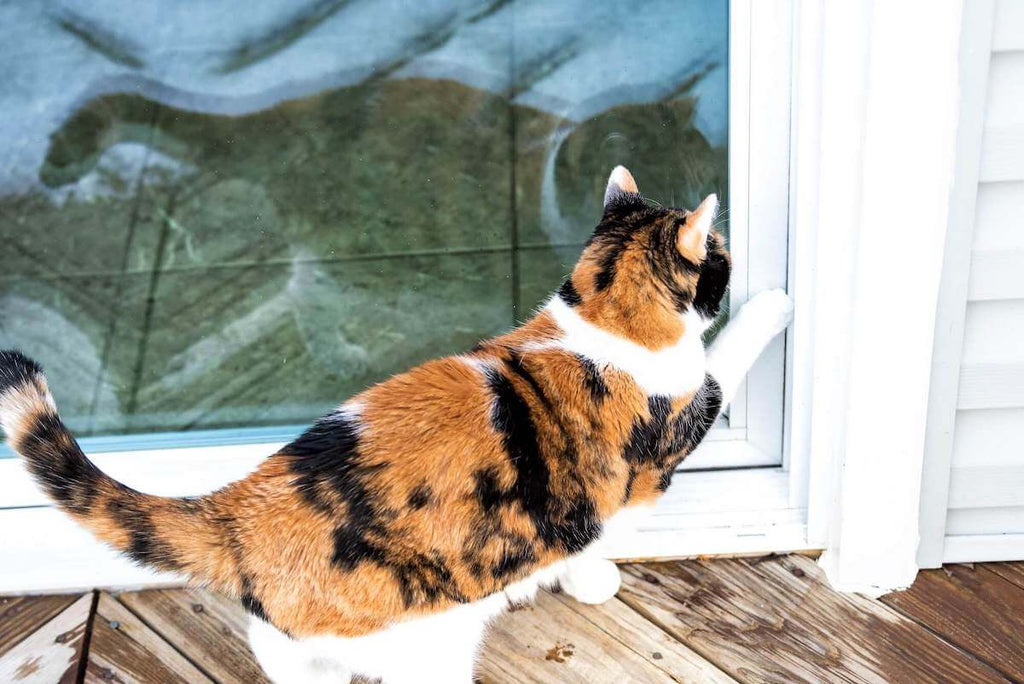
Why Is My Cat Constantly Scratching the Door?

Are you getting overwhelmed because your cat's scratching the doors of your home has become a damage-causing habit? Not only is the constant scratching and scraping bothersome, but it also makes the doors appear worn out and, if you're renting, will likely result in not getting your security deposit back.
Fortunately, there are a few efficient methods for keeping your cat from clawing on doors and to redirect your cat's destructive habit.
Finding Out the Reason Behind Your Cat's Scratching
First and foremost, it's helpful to iscover the reason for your cat's scratching, as it will assist you in identifying an appropriate solution.
Cats are highly social animals who typically enjoy interacting with their owners as well as with other pets in the home. When you leave your cat alone in a separate room, scratching may be her method of getting your attention to come back. The friendlier your cat is, the more likely it is that she may turn to scratch when you close the door on her when you leave the room.
There's a reason why the expression about curious cats is so popular. The next time your feline companion claws at a closed-door, it's possible that she's curious about the smells or sounds on the other side.
If you used to allow your cat to walk freely in and out of a room, such as your bedroom, and then you abruptly cut her off, she may resort to scratching in order to urge you to let her back into the space.
Scratching is also a natural, instinctive behavior for her so the behavior will likely need to be redirected. Cats scratch to relieve anxiety, keep their nails healthy, to knead when they’re happy and a host of other reasons.
Catnip Can Be Helpful To Ease Cat Scratching
Catnip is a common weed that is non-toxic and belongs to the mint family. Cats are drawn to the plant because of the volatile oils and acids it releases in large quantities. A whiff of catnip will normally cause the cat to roll about, drool, and purr for around ten minutes after being exposed to it.
Catnip should be rubbed into a cat tree or scratching post before placing it outside the door. This should divert the cat's attention away from the door and toward the tree or post where it belongs making it more likely for them to scratch the post than the door.
Add Mental Stimulation to Your Cat’s Routine
A bored cat can be distracted by activities such as playing with toys and bird watching, which will keep them away from doors and other furniture.
Place a variety of toys in different areas of the house where the cat likes to visit to keep him entertained. Cats are particularly fond of toys that make noise and have a fluffy feel, but this could be a trial and error process finding their favorite toy.
You can also install a cat perch close to a window. Cats enjoy birding and surveying their surroundings. A platform can be a great distraction for your cat, especially if there isn't much else for them to do in the house.
Ensure the Door is Protected with a Shield
While these tips are helpful, they don’t guarantee your cat won’t cause damage. To fully prevent damage to your doors, grab a CLAWGUARD Original Door Shield.
Frosted Clear high-tech plastic was created to complement any door color and décor, allowing you to keep your home looking its best. It is possible to protect your home by constructing a long-lasting barrier. Then, especially while your cat is in 'training,' you can rest assured your doors are protected.
Looking for training resources? Visit Free Will Animal Training!
Written by Amber Drake

